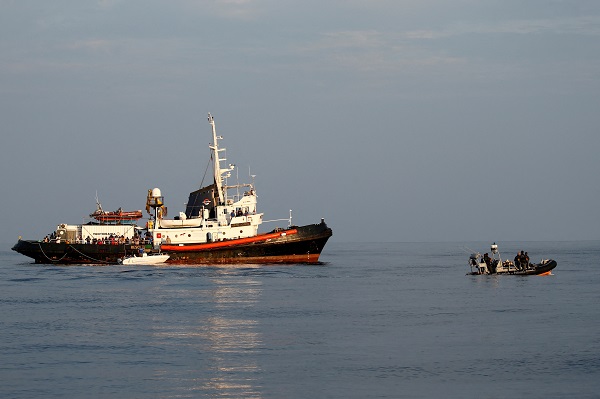 A rigid-hulled inflatable boat (RHIB) of the Italian Finance Police;
Credit: REUTERS/Darrin Zammit Lupi
A rigid-hulled inflatable boat (RHIB) of the Italian Finance Police;
Credit: REUTERS/Darrin Zammit Lupi
ROME (Reuters) - On Thursday 23 February 2023, Italy's parliament passed into law a government decree establishing a code of conduct for migrant charity ships, despite criticism from the United Nations and humanitarian groups that it will imperil lives.
The new set of rules is part of Prime Minister Giorgia Meloni's efforts to crack down on the rescue vessels, which her government says encourage people to make the perilous trip across the Mediterranean from northern Africa.
Charities deny this, saying migrants set to sea regardless of whether rescue boats are in the vicinity.
Under the new law, ships have to request access to a port and sail to it "without delay" after a rescue, rather than remain at sea looking for other migrant boats in distress, and disclose detailed information about their rescue activities.
Previously, vessels operated by charities, or non-governmental organisations (NGOs), often spent several days in the central Mediterranean and regularly completed multiple rescues before heading north towards Italy.
Captains breaching the new rules risk fines of up to €50,000, and repeated violations can result in their vessels being impounded, the law stipulates.
Hours after the parliamentary vote, the Doctors Without Borders (MSF) charity said its Geo Barents vessel had been blocked for 20 days and the organisation fined €10,000.
The sanctions were imposed after MSF was accused of withholding some information about a rescue it completed last week, when the Geo Barents took 48 migrants to the Adriatic port of Ancona, a spokesperson for the charity said. "We are assessing what legal actions we can take to challenge what happened. It is not acceptable to be punished for having saved lives," MSF said in a tweet.
'EXPLOITATION, FORCED LABOUR'
Nicola Molteni, a deputy interior minister and member of the hard-right League party, told the upper Senate before its final vote on Thursday that "if immigration is not controlled, it creates exploitation, forced labour, illegal labour."
Humanitarian groups said banning multiple rescues would cause ever more deaths while the United Nations urged Italy to withdraw the decree.
"This is simply the wrong way to address this humanitarian crisis," said Volker Türk, the U.N. High Commissioner for Human Rights. The Roman Catholic Church in Italy last month said the new measures violated international law and should be scrapped.
NGOs also complain the government is forcing them to take migrants to distant northern Italian ports, far from where they carry out the rescues.
The new obligations have significantly increased costs for the NGOs and only a few boats have taken to sea in recent months. But their reduced sailings have done nothing to slow the arrival of migrants.
Government data shows 12,667 people have reached Italy so far this year, more than double the same period of 2022. The missing migrants project says at least 157 people have been reported as missing, presumed dead, this year.
An internal interior ministry document seen by Reuters said out of 105,000 migrants who arrived in Italy in 2022, only around 10% were brought ashore by NGO boats.








